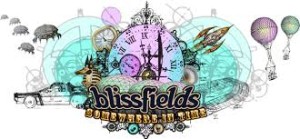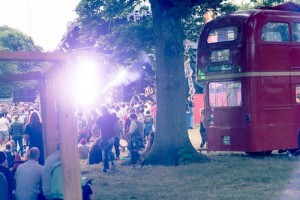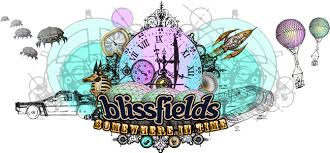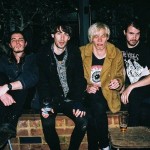 “No fences, no tickets, no stalls, just friends having a great party in a field” is how Blissfields first came into being on 1st September 2001. Nearly 14 years on it is an established small festival still run by its original founders Paul and Mel Bliss. Following GIITTV’s recent trip to the event, we couldn’t resist the temptation to ask a few questions to try and find out the secret of this festival’s longevity.
“No fences, no tickets, no stalls, just friends having a great party in a field” is how Blissfields first came into being on 1st September 2001. Nearly 14 years on it is an established small festival still run by its original founders Paul and Mel Bliss. Following GIITTV’s recent trip to the event, we couldn’t resist the temptation to ask a few questions to try and find out the secret of this festival’s longevity.
What motivated you to start Blissfields?
It really started as a get-together with friends in the back garden. Some of those friends were in bands. We put on some BBQ, and it grew from there. We certainly had no idea back then we’d be inviting 5,000 people to it one day. It’s grown very steadily over the last 15 years, so the motivation was simply to have a party with our friends. It’s just that we now have 5,000 of them.
Over the last 15 years, the festival landscape has changed dramatically, how has it affected Blissfields?
I suppose we’ve noticed it more in recent years on a local level. There’s so much more choice in Hampshire now, with some major events debuting in the last two years. It’s meant we’ve had to define what we do, and put on an incredible small festival to compete with the bigger ones. It’s become equally easier and harder I suppose, but ultimately more rewarding.
What’s your secret of survival when so many festivals fail every year? What’s special about Blissfields?
Like any good small festival, it’s about attention to detail and
remembering your roots. Blissfields is still run by a small DIY team, and while that team does grow year on year, we make sure that we listen to one another. It’s a complete democracy, with nothing off the table, so there’s always scope to change, adapt and bring in new ideas. We try to make sure that people returning to Blissfields can identify with it, so have built a strong core audience but also we reach out to new people every year. We keep things small and try to improve year on year based on feedback we get from press and ticket buyers slowly honing what makes it a good event.
How many people have you got on your team?
On the core team I’d say there’s only around eight of us, then there’s the area managers who help craft their own corner of the festival, and additional members of the booking team. There’s a huge crew involved in making Blissfields happen, from the site build – which takes a lot of time and dedication to get finished on deadline – to sparkies, stewards, security, and every other job you can think of building a small town out in an English field.
How do you normally book your artists? What are your criteria? Do you have a wish list you work from?
We definitely have a wish list, but without getting into the humdrum of the booking process it usually comes down to availability and budgets of the artists. One thing’s for certain though, we all have to agree on the music choices. It’s the main topic of debate at most meetings and where the most feathers fly, but that’s the only way we’d have it. We have a fantastic booking team who work very hard in a difficult climate, and they’ve certainly curated an incredible line-up this year.
Many festivals complain about bigger players imposing exclusivity clauses on artists. Is it something that affected you in any way?
I don’t think so. When you rely on having the one or two buzz bands that year to hold an audience I can imagine there’s a lot of pressure to secure those acts and being blocked by somebody else must be frustrating. As we’re a small festival with a dedicated following now, there’s a level of trust built whereby we can challenge our audience a bit with somebody they might not have thought of themselves, which allows us to be far more creative in programming our bill. This means we’re not competing with other festivals for acts, rather doing our own thing and setting our own agenda.
Any tips on festival funding? What sort of money are we talking about when it comes to festival budgets? What are your main expenses?
Our main expense is the music line-up. We’re guilty of sometimes getting carried away to put on the best possible show. Music aside, you don’t quite realise how much things cost until you do put on an event: the cost of plumbing, wiring, fencing especially, security, lighting, toilets, and then there’s licensing and the paperwork. The margin between losing a heck of a lot of money, breaking even and enjoying a profit is such a tiny move of the needle. You have to really be in it for the right reasons. If you expect to be making millions of pounds running a festival, you’re in for a surprise… especially if you’re independent, without council or arts funding or huge sponsorship deals with brands.
Ever had any unusual rider requests?
Generally most bands ask for the same old things; it’s boring in a way. If somebody wants something out of the ordinary we’ll always try and get it for them, though. We want the acts that play Blissfields to know that we’ve done all we can. Sometimes they don’t even have to ask. A few years ago when Bastille headlined. It was their drummer Woody’s birthday so we decked out their dressing room like a kids party and had a mini knees up ahead of their performance.
 In terms of festival planning, can you describe to us what you do on a month-by-month basis?
In terms of festival planning, can you describe to us what you do on a month-by-month basis?
It’s pretty hectic from the get-go. We start looking at bands in December, booking in January to announce in February when the announcement will go out to press. Then it’s full-on marketing mode to make sure the word is out there. We spend the spring lining up some more acts to compliment those we’ve booked, look at the other aspects of the festival, such as the huge kids area, the film side, discuss art installations with the Hidden Hedge crew, host some warm up gigs, and then we’re into summer and the main site build. Being one of the first festivals of the year, after Glastonbury, everything’s quite accelerated.
What do you think lies ahead for UK festivals?
Honestly, I don’t know. We only really think about the year ahead and our own event. That’s all we can do. If we thought about the future too much I’m not sure we’d have gotten this far.
Five most important rules for anyone contemplating starting their own festival:
Find a good group of like-minded friends to do it with. Figure out your niche and what kind of people you’re making the festival for. Start small, learn and build your way up. Listen to what people say, but always take everything with a pinch of salt – it’s your festival, so do it the way you want to. Look after people who support your festival either behind the scenes or by buying a ticket – they’re the difference between success and failure.
Read our review of Blissfields 2015 HERE.
Photo credit: Kevin Pick




